New Customer?
Create your accountNo products
Prices are tax included
AUDIO-GD D-27.28 Dual ES9028Pro DAC 32bit / 384kHz DSD512 Amanero TCXO Class A Discrete Headphone Amplifier
By buying this product you get 164 loyalty points
This product has been replaced by the new version, the AUDIO-GD D-27 2022 EDITION DAC 2x ES9038Pro.
Audio-GD D-27 .28
Isolated Amanero, TCXO, DAC Dual ES9028Pro 384kHz/32bit Class A Discrete Headphone Amplifier
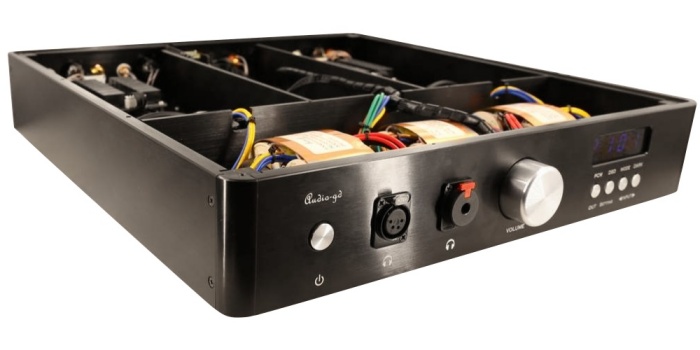
With the D-27.28, Audio-GD has mobilized the best of its technical know-how to build a very complete device. It fulfils the functions of a DAC with exceptional performance, based on a duo of ES9028PRO chips, discrete preamplifier and headphone amplifier.
The D-27 offers an extremely favorable environment to push the boundaries of ESS chips, thanks to the brand's expertise in terms of oversized power supply design, high precision clock integration (TCXO) and digital interface (Amanero).
Its functions are not limited to digital / analog decoding since the device also includes a high-precision headphone amplifier designed exclusively for discrete components and operating in pure Class A.
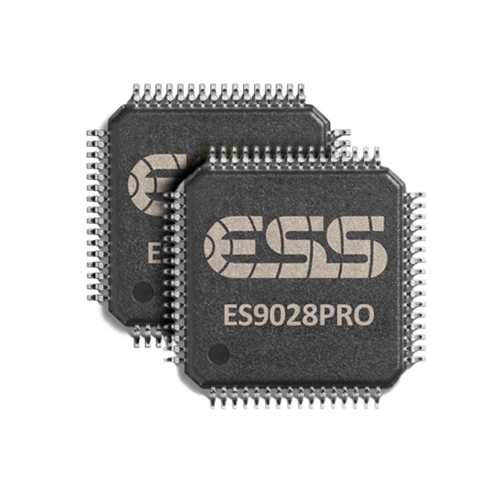
Dual ES9028PRO DAC
This High Fidelity DAC is equipped with the ESS ES9028Pro 32 bit / 384kHz. This conversion chip is able to read High Definition formats from DSD to PCM with an excellent signal-to-noise ratio (120dB real on XLR).
This model is a 32bit 8-channel high-performance system that is first found in studio and audiophile equipment such as SACD, Blu-RAY, digital audio workstation...etc. This component incorporates the Hyperstream II architecture from ESS and offers considerable audio accuracy, particularly with a THD+N at -120dB and an active jitter reduction function.
In this type of configuration, each chip operates in a monophonic manner, which significantly improves channel balance performance while broadening and refining the sound scene. The dynamic is also strengthened with a measurement at 135dB in Mono (against 129 in multichannel).
Audio-GD also includes a high-precision TCXO clock. This allows a perfect synchronization of the data signals for a jitter attenuated to its minimum.
Control by logic circuit (FPGA)
An FPGA logic circuit ensures perfect synchronization between the two decoding chips. Its role is essential: it is the one that separates the digital input stream in order to distribute the signal on each channel.
The FPGA also performs a reclocking function by applying a FIFO process to each input. The data is therefore processed in an environment where clock signals are controlled with unprecedented accuracy, which naturally benefits the overall audio reproduction.
Finally, the logic circuitry contributes to the diversity of compatible connectors and protocols by fully managing the input and decoding of S/PDIF flows. SPDIF decoding is therefore not performed by the ES9038PRO chips, but by the logic circuitry that performs the same function with increased accuracy.
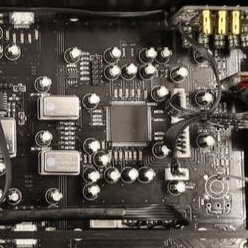
Oversized power supply
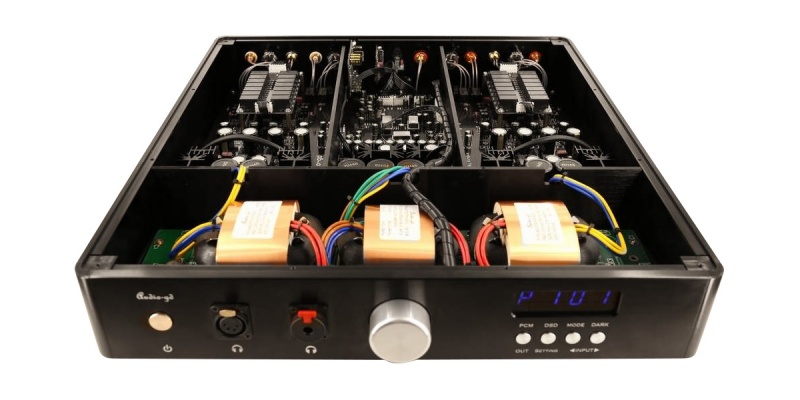
The D-27 uses 3 high quality, low noise, low magnetic loss R-Core transformers for its power supply. This represents a total of 130Watts of power available to power all digital stages as well as right / left output stages.
The digital stages receive power through 15 ultra high-speed, low-noise power units. The output stages are supplied by 4 regulated power supply units operating in pure class A. This construction allows all stages to operate from a clear and independent power supply, an essential condition for achieving superior audio quality.
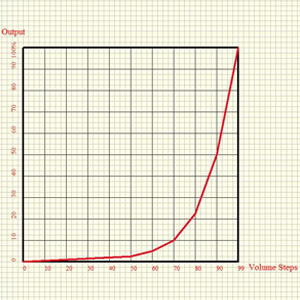
Perfectly balanced volume control
On the volume control side, the D-27.28 adopts a different scheme from traditional technologies. Indeed, in the case of a "classic" volume control, the device implements this function at the analog input amplification stage, via signal reduction using a potentiometer. As a result, the sound reproduction is directly affected by the quality of the potentiometer used, which can result in loss of detail or distortion. Even when using a high quality potentiometer, there is a loss of detail. In addition, regardless of the quality of the potentiometer, this system also impacts the Signal to Noise ratio (SNR).
To overcome this weakness, Audio-GD chooses to use an I/V Converter (Transimpedance Amplifier). Thus, volume control results from a passive variable voltage current conversion at the ACSS output amplification, where the output is the current signal and not the voltage signal. Therefore, the volume depends on the conversion of the current (I) to a voltage (V).
This model allows to maintain the frequency band of the flat signal and therefore not to lose any detail. There is therefore no deterioration in sound quality, regardless of the volume level. Just after this volume control, the brand also integrates a group of 4 diamond buffers without feedback in the output stage, allowing to obtain a very low output impedance.
The quality of volume control is particularly important in a symmetrical system. Indeed, it must guarantee the accuracy of the signal control on the four channels to obtain a perfect balance. Otherwise, significant distortion would be created, which could even greatly limit the value of a symmetrical system. To maintain this balance, Audio-Gd also integrates a 4-channel digital relay control to modify the Vishay resistors and thus avoid imbalance. This allows the D-27 to have an extremely powerful volume control for high quality sound reproduction.
Finally, the DAC volume control can vary over 100 steps to achieve a wide control range of 90dB. Moreover, this control is exponential. Thus the volume progression is very smooth over the first 50 steps allowing a simple and precise adjustment, whether for use with headphones or high or low sensitivity speakers.
A discrete output stage
The last step for the signal is the analog output stage. It must therefore be particularly careful not to affect the overall performance of the DAC. This stage is located after the ES9028 and is based only on discrete transistors. ACSS amplifiers and the gain process benefit from a non-feedback design and operate with a current signal, greatly limiting conversions between current and voltage. The output buffers feature a pure Class A 4x150W design on each channel, allowing the D27 to be used without any problems with the most demanding headphones. The exceptional design of this output stage allows you to deliver a sound of great purity and neutrality.
In addition, the D-27 incorporates a very high quality USB interface: an Amanero Combo 384, which has been integrated into many Audio-GD projects and has proven itself to be one of the best USB interfaces available. An excellent interface therefore, but what is more, it is totally galvanically isolated, allowing it not to be subject to potential interference that could degrade the signal.
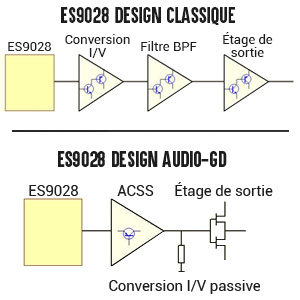
Insulation and adjustment
Audio-GD took care to isolate each section of the D27 sound using 5mm thick Aluminium partitions to limit interference that could degrade the sound reproduction. In addition, the analog sections are placed perfectly symmetrically on each side of the digital section, ensuring an internal wiring of the same length for perfect balancing.
Before being distributed, the D27s also go through a step of adjusting the ESS chips. Thus, after a running-in period, each device is calibrated and then listened to by Audio-GD teams to achieve the lowest possible distortion.
Quality connectic
The D27 also offers complete and high quality connectivity. It includes a coaxial, optical, HDMI I2S, RCA Stereo, XLR stereo and finally a USB input. The latter is based on an excellent Amanero Combo 384 USB interface (integrated option), which has been integrated into many Audio-GD projects and has proven itself to be one of the best USB interfaces available. An excellent interface therefore, but which, moreover, is totally galvanically isolated, allowing it not to be subject to potential interference that could degrade the signal.
On the output side there is RCA and stereo XLR as well as ACSS (Mini XLR) balanced. On the front, the D27 offers two headphone connectors: a 4-pole XLR and a 6.35mm jack plug.

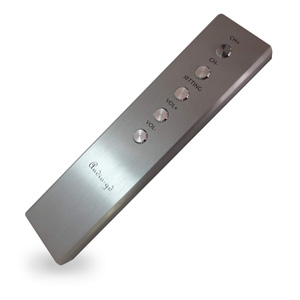
A massive remote control
The D27 comes with a beautiful brushed CNC machined Aluminium remote control. A massive remote control that will prove robust and durable. This allows remote access to all the device's features, including volume control, source selection and parameter modification.
Technical characteristics
| DAC ES9028Pro | |
|---|---|
| Package | 64 eTQFP |
| Dynamic range | Mono : 135dB 8 Channels : 129dB |
| THD+N | -120dB |
| Bitrate | Up to 32bit |
| DSD / DoP | Yes |
| Jitter reduction system | Yes |
| Global specifications | |
|---|---|
| SNR | > 120dB |
| THD | < 0.0003% (Output level 0dBV) |
| Gain | +16dB (XLR) |
| Volume characteristics | 100 steps, exponential curve. |
| Imbalance between channels | < 0.05dB |
| Frequency response | 20Hz - 20kHz (< -0.1dB) 1Hz - 140kHz '-3dB) |
| Output level | Headphone output : 19V RMS (Balanced, max) Variable preamp output : 10V RMS (Balanced, max) Variable DAC output : 5V RMS (Balanced, max) |
| Balanced headphone output power (for headphone > 15 Ohm) | 16000MW / 25 Ohm 8000MW / 50 Ohm 4000MW / 100 Ohm 1300MW / 300 Ohm 650MW / 600 Ohm |
| Output impedance | Headphone output : 1 Ohm DAC Output : 1 Ohm |
| Input sensitivity | Coaxial 75 Ohm : 0.5Vp-p Optical : 19dBm |
| Supported OS (USB) | Windows, OSX, Linux, ISO |
| Sampling rate | USB : Up to 384kHz / DSD512 (integrated Amanero) I2S : Up to 384kHz / DSD512 Coaxial : Up to 192kHz Optical : Up to 96kHz |
| General | |
|---|---|
| Power supply | 220-240V AC 50/60Hz (cable included) |
| Consumption | 60W |
| Package weight | Approx 12kg |
| Dimensions | 430 x 445 x 80mm |
| Package | 1x Audio-GD D-27.28 1x Power supply cable 1x USB cable 1x Télécommande Aluminium |
| Input | Optical |
| Input | RCA |
| Input | SPDIF |
| Input | I2S via HDMI |
| Input | XLR |
| Output | RCA |
| Output | ACSS |
| Output | XLR |
| Color | Black |
| Remote Control | Yes |
No reviews at this time.


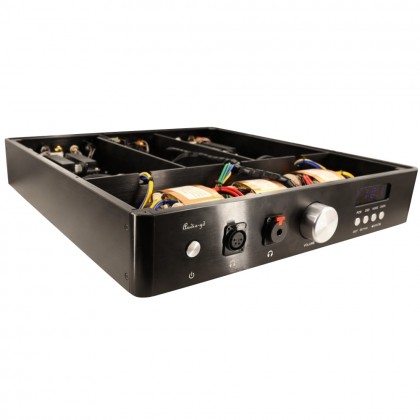














![[GRADE S] FURUTECH DAS-4.1 Balanced Interconnect Cable OCC DUCC Copper Ø10mm 1.3m](https://www.audiophonics.fr/64493-thumb_default/furutech-das-41-balanced-interconnect-cable-occ-ducc-copper-o10mm.jpg)
![[GRADE A] AUNE S9C PRO DAC 2x ES9068AS Discreet Headphone Amplifier 5W Bluetooth 32bit 768kHz DSD512 MQA Back](https://www.audiophonics.fr/64487-thumb_default/aune-s9c-pro-dac-2x-es9068as-discreet-headphone-amplifier-5w-bluetooth-32bit-768khz-dsd512-mqa-back.jpg)

![[GRADE A] Mono Power Amplifier Modules LM3886 with Heatsinks 2x120W / 8 Ohm (Pair)](https://www.audiophonics.fr/64212-thumb_default/mono-power-amplifier-modules-lm3886-2x120w-8-ohm-pair.jpg)
![[GRADE S] IAN CANADA STATIONPI SMT Raspberry Pi and HAT Boards Adapter Station](https://www.audiophonics.fr/64200-thumb_default/ian-canada-stationpi-smt-raspberry-pi-adapter.jpg)














